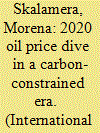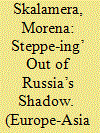|
|
|
Sort Order |
|
|
|
Items / Page
|
|
|
|
|
|
|
| Srl | Item |
| 1 |
ID:
178120


|
|
|
|
|
| Summary/Abstract |
The quick rise of commercially viable renewable energy worldwide presents encouraging opportunities for sustainable growth, but it also portends new risks. Hydrocarbon-producing nations of Eurasia have typically strongly relied on geographic proximity to their most lucrative export market: Europe. Yet the revolutionary nature of Europe's ‘Green Deal’ means that their position is under threat. While the demand-side ramifications of the global low-carbon transition are widely discussed, little consideration has been given to the inevitable implications for hydrocarbons producers, particularly in the less-studied central Asian region. This article draws attention to the interconnections between hydrocarbon rents, regime stability and new foreign policy strategies in Kazakhstan, Uzbekistan and Turkmenistan in the wake of the global shift away from oil to renewable energy. By so doing, it systematically examines what implications the energy transition has on crucial petrostates in central Asia, and what this, in turn, means for international stability.
|
|
|
|
|
|
|
|
|
|
|
|
|
|
|
|
| 2 |
ID:
158049


|
|
|
|
|
| Summary/Abstract |
On 21 May 2014, during a state visit by President Vladimir Putin to Beijing, China and Russia signed a $400 billion, 30-year gas deal. Under this agreement, China will import 38 billion cubic metres of natural gas from Russia’s Gazprom, beginning in 2018. Why, after 15 years of stalemated negotiations, did this breakthrough occur in 2014? Why did a natural, symbiotic gas relationship not develop earlier and more gradually? Most studies explain this by looking at Russia’s international isolation post Ukraine. Based on interviews with both Chinese and Russian officials this article argues the following: domestic incentives, rather than foreign-policy pressures, are the real force behind the timing of Sino–Russian energy breakthroughs in 2014.
|
|
|
|
|
|
|
|
|
|
|
|
|
|
|
|
| 3 |
ID:
190371


|
|
|
|
|
| Summary/Abstract |
Long-term changes propelled by the clean-energy transition—in the distribution of geopolitical power, the meaning of sustainable energy consumption, and the scope and character of interdependence—are transforming the global energy order. Dependence on new critical materials and metals—such as chromium, copper, germanium and lithium, all essential inputs for many clean energy technologies—reflects new patterns of asymmetrical interdependence and calls into question some of our assumptions about oil and gas as strategic goods. Among these changes, the critical materials at the heart of the clean energy transition are infusing the geopolitics of energy with new meaning: the rise of renewables is undermining Russia’s position as an “energy superpower” at the precise moment that its relationship with Europe is being reshaped by its invasion of Ukraine.Footnote
|
|
|
|
|
|
|
|
|
|
|
|
|
|
|
|
| 4 |
ID:
156304


|
|
|
|
|
| Summary/Abstract |
Conventional wisdom holds that China and Russia have managed to reach a tacit understanding over their respective roles in Central Asia. Some argue that, with Beijing effectively conceding to Russia the leading role in an emerging security architecture, the threat of a renewed Great Game in the region has been deferred.1 Others concur that, to many observers’ surprise, Central Asia’s independent states have not become objects of rivalry between Moscow and Beijing, but rather a major unifying element in Sino-Russian relations.2 The two governments, they underscore, cooperate more closely in Central Asia than in any other world region. A third group suggests that based on the evidence available thus far, Russia and China have upended predictions of greater competition and succeeded in transforming a potential source of tension into a means of greater cooperation and mutual reassurance.3 More recently, thanks to Russia’s involvement in the Syrian and Ukrainian conflicts, and internal economic woes caused by the imposition of Western sanctions and the decline in the price of oil, many leading observers believe Russia is neglecting its ‘soft underbelly’ – Central Asia – and losing ground in the region.
|
|
|
|
|
|
|
|
|
|
|
|
|
|
|
|
| 5 |
ID:
188299


|
|
|
|
|
| Summary/Abstract |
This essay analyses the evolving character of Russia’s energy relationships in the post-Soviet space by looking at the Caucasus and Central Asia. In the past, due to the historic legacy of Russia-controlled pipelines, Moscow was able to exert influence by manipulating structural asymmetries in regional natural gas value chains. This has changed with China’s entry as the region’s major market alternative and the breakthroughs of the global energy transition. The initial phase of Russia’s declining ‘energy power’ vis-à-vis China in Central Asia came to an end as the Crimea crisis was unfolding, an event that has drastically changed the risk perception of Russian gas in Europe, setting off a chain of consequences that led to a re-evaluation of Russia’s energy power in post-Soviet Eurasia. The essay also shows, however, that Russia maintains influence in post-Soviet Eurasia through inter-elite networks and shared concerns among hydrocarbon-exporting countries about the energy transition.
|
|
|
|
|
|
|
|
|
|
|
|
|
|
|
|
| 6 |
ID:
143260


|
|
|
|
|
| Summary/Abstract |
The current Ukraine crisis is often portrayed as a contest between Ukraine's desire to adopt West European standards of living and its historical pull towards Russia's sphere of influence. This ostensibly has made Ukraine unable to tilt successfully either toward the European Union or Russia. Yet, this narrative has neglected that Ukraine is significant precisely because of its geographical position and its role as a transit country for Russian gas en route to Europe.
|
|
|
|
|
|
|
|
|
|
|
|
|
|
|
|
|
|
|
|
|